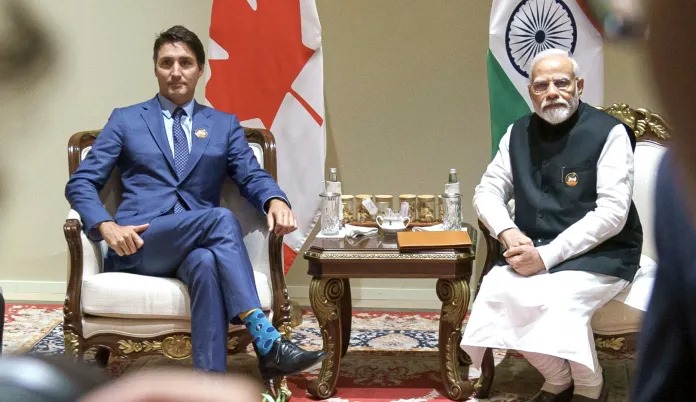In a recent turn of events, Canada’s Foreign Minister, Melanie Joly, announced the expulsion of a senior Indian diplomat from the country, further straining bilateral relations between Canada and India. The expulsion comes in the wake of allegations made by Canadian Prime Minister Justin Trudeau, suggesting Indian involvement in the assassination of Hardeep Singh Nijjar, a wanted Khalistani terrorist. As this diplomatic row unfolds, trade talks have been derailed, and Canada has canceled a trade mission to India that was scheduled for the fall.
Hardeep Singh Nijjar, a Sikh separatist leader sympathetic to the cause of Khalistan—an independent Sikh state carved out of India—was fatally shot on June 18th at the Guru Nanak Sikh Gurdwara in Surrey, British Columbia. Nijjar’s death sent shockwaves through Canada’s Sikh community, which accounts for more than 770,000 people, roughly 2% of Canada’s total population.
Canadian security agencies have been investigating credible allegations of a potential link between agents of the Indian government and Nijjar’s murder. Prime Minister Trudeau stated, “Allegations that a representative of a foreign government may have been involved in the murder of a Canadian citizen… are totally unacceptable.” These allegations have ignited a diplomatic firestorm, with Canada taking the unprecedented step of expelling an Indian diplomat believed to be connected to the assassination.
India swiftly rejected the allegations made by Canada. The Ministry of External Affairs (MEA) issued a statement calling the accusations “absurd and motivated” and emphasized India’s strong commitment to the rule of law. The Indian government’s stance, coupled with concerns expressed by Prime Minister Narendra Modi during the G20 Summit regarding protests in Canada against India, highlights the depth of the diplomatic rift.
Canada boasts the highest population of Sikhs outside of India’s Punjab state, making it a focal point for Sikh-related issues and protests that have sometimes irked India. Moreover, Canada is home to one of the largest overseas communities of Indian origin, numbering approximately 1.4 million individuals within the country’s overall population of 40 million. The interplay of these demographics adds complexity to Canada-India relations.
On social media, reactions to the diplomatic dispute have been mixed. Some argue that Prime Minister Trudeau’s allegations may have inadvertently bolstered Prime Minister Modi’s reputation in India, as they align with his tough stance on separatism. Critics of Trudeau have cited past instances, such as his apology for “imaginary mass graves,” as evidence of performative acts. They view his recent actions as politically motivated and question their impact on the broader geopolitical stage.
The expulsion of an Indian diplomat and the escalating tensions between Canada and India highlight the complexity of relations between two nations with significant Sikh populations and diaspora communities. While the investigation into Hardeep Singh Nijjar’s assassination is ongoing, the diplomatic fallout serves as a reminder of the challenges in balancing international diplomacy, domestic politics, and the sensitivities of diaspora communities in a globalized world. The path forward for these two nations remains uncertain as they navigate this turbulent diplomatic chapter.

